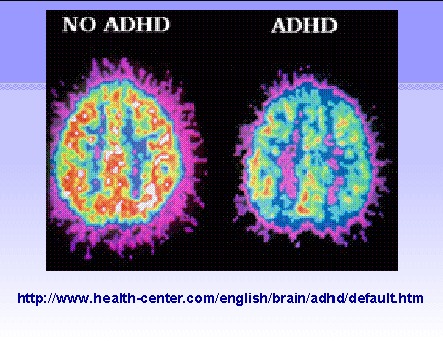Attention Deficit Disorder (ADHD/ADD)
From Wikiwel
Symptoms
Home remedies
- Nutrients (vitamins and minerals) are absolutely vital for proper brain function in both younger children and teens.
- Magnesium is used in over 300 enzymes, many of which are BRAIN enzymes. A low magnesium level is linked to ADHD as well as autism, aggressive behavior, overexcitability, anxiety, depression, fatigue and learning disabilities. And what makes it worse is when kids that are low on magnesium drink a lot of milk. You see, calcium needs magnesium to be absorbed by the body, so a huge intake of milk zaps up an already-low magnesium supply. That means there's little or none left for the brain.
- Iron is like the body's oxygen shuttle, carrying oxygen from the lungs to every cell in your body. Low levels of iron can cause poor brain functioning and erratic behavior.
- Zinc : Many brain enzymes are zinc-dependent, so it's essential that the brain has adequate supplies of zinc. In addition, zinc helps balance blood sugar, so kids that are low on it crave sweets and refined carbohydrates and reject nutritious proteins and vegetables. Zinc deficiency can lead to angry, aggressive behavior, bulimia, frequent headaches, depression with suicidal ideation and anorexia nervosa.
- phytoestrogens like found in Soy is thought to be responsible for the increased amount of learning disabilities and cases of ADD/ADHD.
- French Pine Bark's rich array of phenolic acids, catechin, procyanidins and taxifolin can help effectively treat ADHD symptoms.
- Phosphatidylserine in combination with omega-3 fatty acids may aid in the treatment of ADHD in children, suggests a 2012 study published in European Psychiatry.For the study, 200 children with ADHD were assigned to 15 weeks of treatment with either a placebo or supplements containing phosphatidylserine and omega-3 fatty acids. Study results revealed that participants treated with the combination of phosphatidylserine and omega-3 fatty acids experienced a significantly greater reduction in hyperactive/impulsive behavior and a greater improvement in mood (compared to those given the placebo).
- Tyrosine is used for depression, attention deficit disorder (ADD), attention deficit-hyperactivity disorder (ADHD), the inability to stay awake (narcolepsy), and improving alertness following sleep deprivation.
- Stinging Nettle shows promise as a possible treatment for Alzheimer’s disease and ADHD.
- Hops is used to treat attention deficit-hyperactivity disorder (ADHD), nervousness, and irritability.
- Thorowax root has cell-stimulating, anti-inflammatory, and sedative effects. When used to treat ADHD, the sedative effects of the herbs can help control impulsive behavior and prevent hyperactivity. The sedative effects are extremely mild, and provide just enough sedation to benefit ADHD - not remove all personality from the child or adult taking the herb.
- Oriental ginseng : Ginseng is an herb known for its concentration-boosting effects, which is why many memory-boosting supplements contain ginseng. Ginseng also increases endurance and relieves stress. The herb is known for its ability to improve oxygen flow to the brain, which encourages normal brain development. As some children with ADHD have a developmental delay of about three years, this is an effective herb for treating ADHD.
- Skullcap root is an herb that protects the nervous system. In many children with ADHD, the balance of the chemicals in the brain controlling the nervous system is off. Skullcap root can help retain the normal balance of chemicals in the brain. Skullcap root is particularly helpful for preventing hyperactivity and calming the nerves.
- Red jujube : The jujube has many helpful properties, but for ADHD, the herb is more effective for calming the nerves and mind and creating a peaceful effect in the body.
- Ginkgo Biloba is an herb that is known for its ability to boost cognitive function in the brain. Ginkgo increases the amine neurotransmitter substances in the brain, which helps counteract some of the chemical deficiencies often seen in children with ADHD. Ginkgo can calm the mind and promote a peaceful spirit.
- Poria has many benefits, including improving digestion and soothing the nerves. Many children with ADHD have poor digestion, and supplementing with poria can improve the health of the intestines and promote the elimination of toxins that can contribute to ADHD symptoms.
Warnings
References
Medical Disclaimer
This information is not meant to be substituted for medical advice. Always consult a medical professional regarding any medical problems and before undertaking any treatment or dietary changes.
